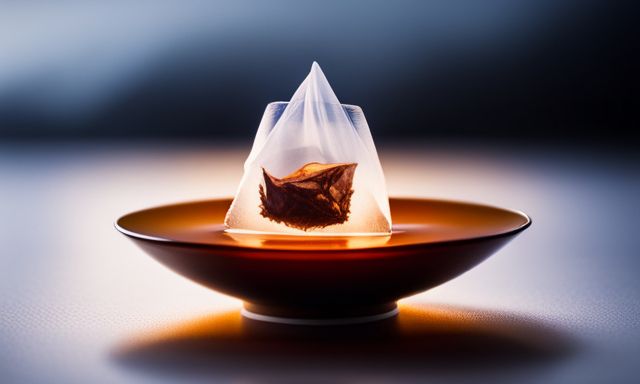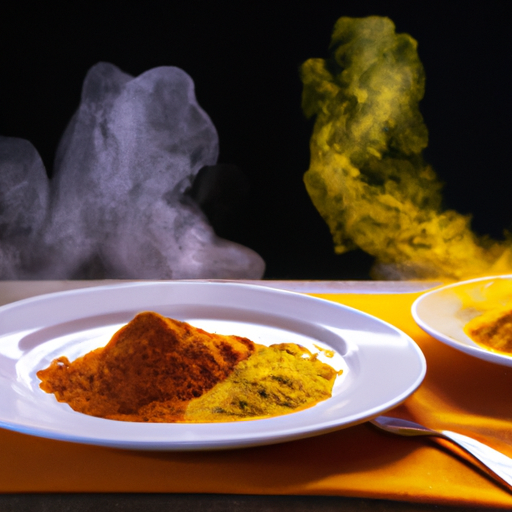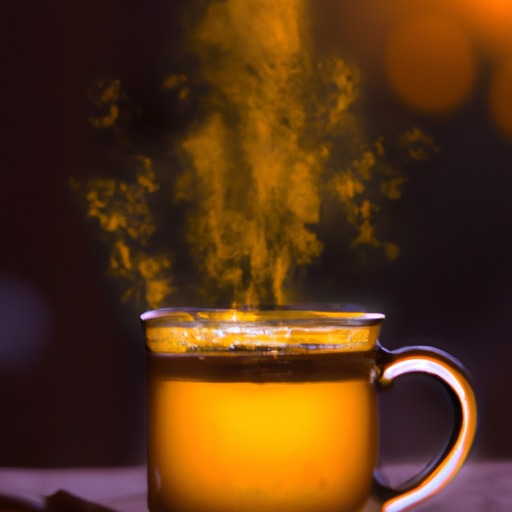Turmeric tea has gained popularity in recent years for its numerous health benefits. As a health-conscious individual, I am always on the lookout for natural remedies to improve my well-being. That’s why the question ‘Is turmeric tea caffeinated?’ intrigued me. By juxtaposing the contrasting elements of turmeric, a well-known spice, and caffeine, a stimulant found in many beverages, we can delve into the world of this vibrant yellow tea.
In this article, we will explore the caffeine content in turmeric tea and understand why it has become a popular caffeine-free alternative to traditional teas. Additionally, we will discover alternative herbal tea options and learn how to brew the perfect cup of turmeric tea to enjoy anytime.
So let’s dive into the world of turmeric tea and uncover the truth behind its caffeine content.
Key Takeaways
- Turmeric tea is caffeine-free.
- Turmeric tea contains curcumin, which has anti-inflammatory and antioxidant properties.
- Turmeric tea can be enjoyed at any time of the day and provides a gentle energy boost without the negative effects of high caffeine levels.
- Turmeric tea can be made with different recipes and ingredients to suit individual preferences.
Understanding Turmeric Tea
Turmeric tea is a delicious and soothing beverage that offers numerous health benefits. Drinking turmeric tea regularly can help reduce inflammation, boost the immune system, and improve digestion. It’s also known to have antioxidant properties that protect the body from free radicals.
There are different recipes for making turmeric tea, such as adding ginger or black pepper to enhance its flavor and health benefits. Some people prefer to make a turmeric tea paste by combining turmeric powder with coconut oil or milk. Others like to steep fresh turmeric root in hot water and then add honey or lemon for taste.
Exploring the ingredients used in making turmeric tea can help you find the recipe that suits your taste and desired health benefits.
Exploring the Ingredients
When you steep a warm cup of this golden elixir, you’ll find yourself enveloped in the aromatic dance of exotic spices and vibrant flavors. Turmeric tea is not only delicious, but it also offers numerous health benefits. Turmeric, the star ingredient, contains curcumin, a compound known for its anti-inflammatory and antioxidant properties. Other common ingredients in turmeric tea include ginger, cinnamon, and black pepper, each adding their own unique health benefits. To give you a better idea, here’s a breakdown of the ingredients and their benefits:
| Ingredient | Health Benefit |
|---|---|
| Turmeric | Anti-inflammatory, antioxidant, improves brain health |
| Ginger | Reduces nausea and muscle pain, boosts immunity |
| Cinnamon | Helps regulate blood sugar levels, reduces inflammation |
| Black Pepper | Enhances curcumin absorption |
Now, let’s move on to the caffeine content in turmeric tea, and how it compares to other beverages.
The Caffeine Content in Turmeric Tea
Get ready to experience a delightful boost with turmeric tea, as it’s energizing properties may pleasantly surprise you. While turmeric itself doesn’t contain caffeine, some brands may include other ingredients like black tea or green tea, which do contain caffeine.
However, the caffeine content in turmeric tea is generally lower compared to traditional caffeinated beverages like coffee or black tea.
The effects of caffeine on the body can vary from person to person. Some individuals may experience increased alertness and improved concentration, while others may feel jittery or have difficulty sleeping. However, turmeric is known for its calming properties and may actually promote better sleep quality.
While turmeric tea may have a lower caffeine content, it still provides a gentle energy boost without the potential negative effects associated with higher caffeine levels.
Now, let’s explore the benefits of caffeine-free herbal tea.
Benefits of Caffeine-Free Herbal Tea
Indulge in the soothing benefits of caffeine-free herbal tea and discover a world of relaxation and rejuvenation. Herbal teas are not only rich in flavors, but they also offer a wide range of health benefits. When choosing the right herbal tea for your needs, it’s important to consider the specific benefits you’re looking for. For example, chamomile tea is known for its calming properties and can help promote better sleep, while peppermint tea can aid in digestion and relieve stomach discomfort.
To help you visualize the various options available, here’s a table showcasing some popular herbal teas and their associated health benefits:
| Herbal Tea | Health Benefits |
|---|---|
| Chamomile | Calming, promotes better sleep |
| Peppermint | Aids digestion, relieves stomach discomfort |
| Ginger | Reduces inflammation, soothes nausea |
| Rooibos | Rich in antioxidants, supports heart health |
By exploring these caffeine-free herbal teas, you can find the perfect option to suit your needs. Transitioning into the subsequent section about alternative caffeine-free tea options, you’ll discover even more delightful choices.
Alternative Caffeine-Free Tea Options
Discover a plethora of invigorating and caffeine-free tea options that will tantalize your taste buds and provide a refreshing alternative to traditional tea. Caffeine-free herbal teas not only offer a wide range of flavors, but they also come with numerous health benefits.
Chamomile tea, for example, is known for its calming properties and can help with sleep and relaxation. Peppermint tea is a popular choice for its refreshing taste and ability to aid digestion. Rooibos tea, with its rich and earthy flavor, is packed with antioxidants that support overall health. Other popular caffeine-free tea flavors include hibiscus, ginger, and lemongrass.
These teas not only provide a delightful taste experience but also offer various health benefits.
Now, let’s move on to how to brew the perfect cup of turmeric tea.
How to Brew the Perfect Cup of Turmeric Tea
Start by gathering all the necessary ingredients and preparing yourself to embark on a journey of brewing the perfect cup of soothing and flavorful turmeric-infused goodness.
- Begin by boiling water in a saucepan and adding freshly grated or ground turmeric.
- Allow the mixture to simmer for about 10 minutes, ensuring that the turmeric is fully infused into the water.
- Next, add a dash of black pepper, which enhances the absorption of curcumin, the active compound in turmeric.
- For added flavor, you can include ingredients like ginger, cinnamon, or honey.
- Once the tea is brewed, strain it into a cup and enjoy its vibrant golden hue and earthy aroma.
Turmeric tea recipes abound, and this delightful beverage offers numerous health benefits. From its anti-inflammatory properties to its potential immune-boosting effects, turmeric tea is a fantastic addition to your daily routine.
Transitioning into the next section, "enjoying turmeric tea anytime," let’s explore the versatility of this remarkable beverage.
Enjoying Turmeric Tea Anytime
Savor the invigorating warmth and soothing flavors of this versatile brew, making it a delightful addition to any moment of your day. Turmeric tea can be enjoyed at any time, whether it’s a cozy morning ritual or a calming nighttime treat.
There are numerous turmeric tea recipes available that can cater to your taste preferences and health goals. This golden elixir is not only delicious but also packed with health benefits. Turmeric contains curcumin, a powerful antioxidant and anti-inflammatory compound that may help reduce inflammation, boost immunity, and support heart health. Research suggests that regularly consuming turmeric tea may also aid digestion, promote brain health, and even support weight loss.
So why not indulge in a cup of turmeric tea and reap the benefits it has to offer?
Frequently Asked Questions
What are the potential side effects of consuming turmeric tea?
Turmeric tea can have potential side effects like upset stomach or gallbladder problems. It’s important to be cautious about potential interactions with medications and stick to the recommended dosage.
Can turmeric tea help with weight loss?
Turmeric tea can potentially aid in weight loss due to its anti-inflammatory properties and ability to increase metabolism. Adding it to a balanced diet and exercise routine may support weight management. Try these turmeric tea recipes for added benefits.
Is turmeric tea safe to consume during pregnancy?
Turmeric tea is generally safe to consume during pregnancy and can help with morning sickness. It has been used for centuries in Ayurvedic medicine and can support prenatal health.
Does turmeric tea have any impact on blood pressure?
Turmeric tea has been shown to have a positive impact on blood pressure by reducing cholesterol levels and promoting heart health. It is a safe and beneficial choice for maintaining healthy blood pressure levels.
Can turmeric tea be used as a natural remedy for arthritis pain?
Turmeric tea can be a natural remedy for arthritis pain. It has anti-inflammatory properties that can help reduce joint swelling and relieve discomfort. Try adding ginger or honey to enhance the benefits.
Conclusion
In conclusion, turmeric tea is a delightful and caffeine-free option for those seeking a soothing and healthful beverage. It offers a range of benefits, from reducing inflammation to improving digestion. So, whether you’re sipping it in the morning to start your day or enjoying a cup in the evening to unwind, turmeric tea is a delicious way to incorporate the goodness of turmeric into your daily routine. Give it a try and let its golden goodness brighten your day!










